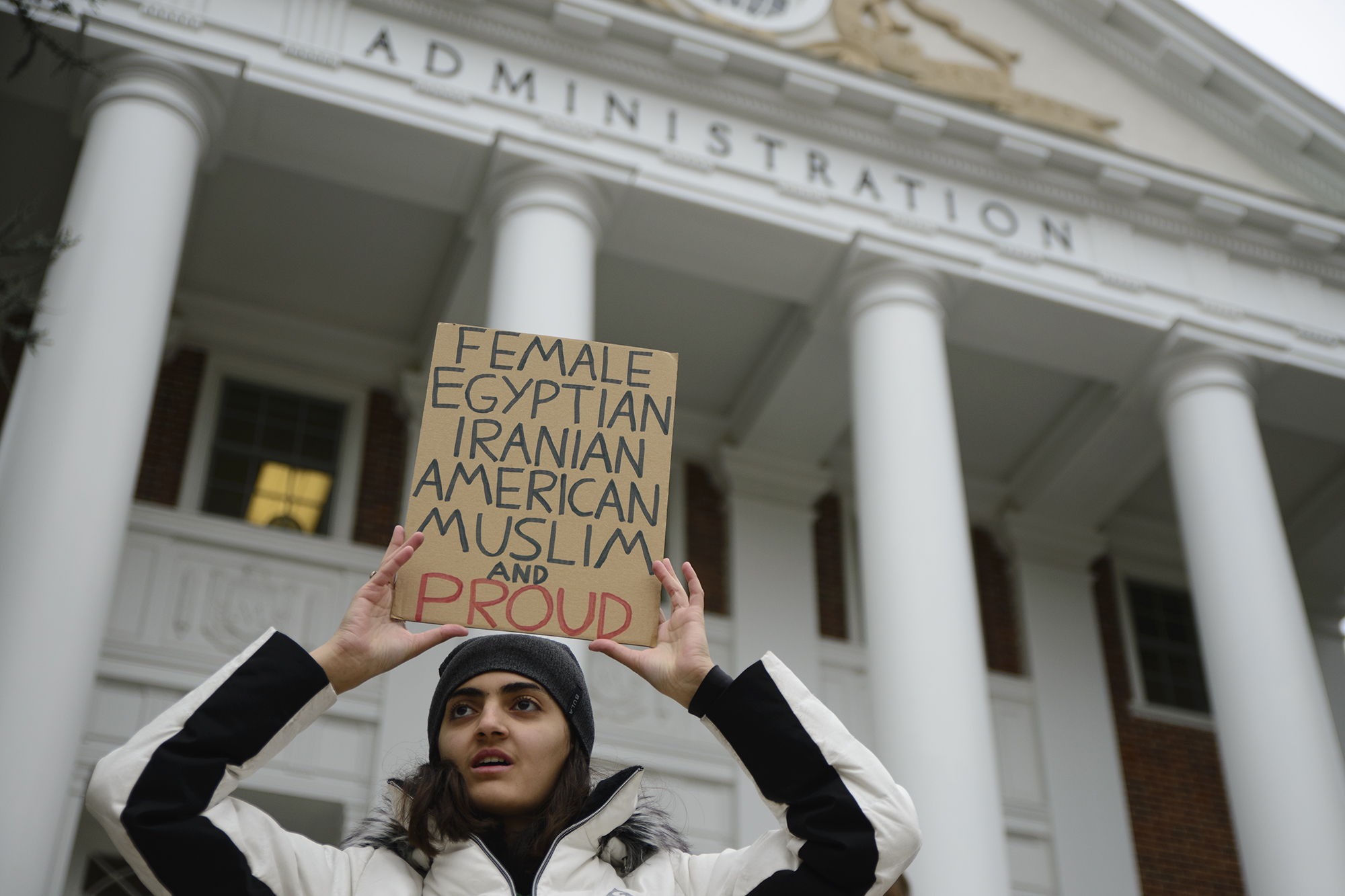By Carrie Snurr and Laura Spitalniak
Staff writers
Carrying signs Wednesday that read “Ban white supremacy” and “Down with racism” in English, Arabic and Farsi, University of Maryland students protested President Trump’s executive order temporarily banning immigration from seven predominantly Muslim countries and suspending the U.S. refugee program.
Students for Justice in Palestine organized Wednesday’s rally to support refugees, immigrants and their family members who might be affected by Trump’s recent travel ban. Miranda Mlilo, president of Students for Justice in Palestine, opened the march by telling participants and onlookers, “We want to send a message to Loh and the university administration.”
Students, professors and community members gathered in front of McKeldin Library and then walked to the Main Administration Building, chanting calls to actions like “No ban, no wall, racism has got to fall” and “Let them in.” Speakers demanded action from university President Wallace Loh and asked participants to fight the executive order by calling their legislators and other government officials.
The march grew as the rally moved to the Main Administration Building, where speakers shared personal stories of being immigrants and having refugee families. The crowd of at least 200 people at times spilled into the street.
William Ryba, a freshman chemistry major, joined the rally on crutches with a torn ACL. Attached to his backpack, a sign read “Doctor told me walking was a bad idea. I am walking here today because this matters.”
“It’s a bad idea to ban a group of people based on one fact,” Ryba said. “This has happened before, and it’s had disastrous consequences.”
Niko Schultz, a senior Japanese and math major who attended the rally with the Japanese American Student Association, compared the travel ban to the Japanese internment camps of World War II. Protesters fought against the camps while they were in place, and for years afterward demanded reparations to Japanese-Americans who were interned, she said.
“They said, ‘Never again,'” Schultz said. “Have we learned nothing? The same thing is happening today. We can’t wait another 50 years for the government to admit that what it is doing is wrong.”
At this university, about 350 people — mostly graduate students, post-doctoral researchers and visiting scholars — are affected by Trump’s ban, Loh wrote in a message to the campus community Tuesday. A visiting professor from abroad said he is no longer coming to teach at this university as part of a personal protest against the ban, although he is not affected.
A university student and green card holder was also detained at Washington Dulles International Airport on Saturday night, along with her 5-year-old cousin, after returning from a trip to see relatives in Turkey.
Hail Alhashem joined the rally, even though she does not attend this university. The George Washington University junior heard about the event on Facebook and came with her sister.
Alhashem said both of her parents are immigrants — her mother from Palestine and her father from Georgia — and that she was especially troubled to see the country turning away refugees.
“It’s our duty to come out and oppose this,” Alhashem said.
In his campus-wide message, Loh pledged his support for the students and their families affected by the travel ban. Loh advised students who might be affected by the ban to postpone any travel arrangements they may have, and wrote that the university is trying to intervene on the behalf of students who have been detained.
“As a public institution, the University of Maryland does not normally take stands on political issues,” Loh wrote. “We have an obligation to speak out when government actions are fundamentally antithetical to the core values and missions of the institution, especially when they adversely impact many members of our community.”
Loh also pledged support for DACA and DREAMer students, promising that the university would not turn over information on students to Immigration and Customs Enforcement officials or allow immigration officials to search for undocumented students without a court order.



